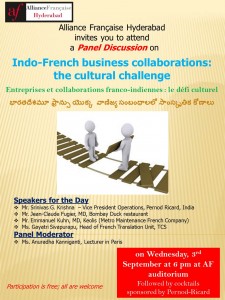 This event aims at extending the Indo-French cultural dialogue to the business domain, in the form of a panel discussion with Indian and French representatives from different sectors and organizations.
This event aims at extending the Indo-French cultural dialogue to the business domain, in the form of a panel discussion with Indian and French representatives from different sectors and organizations.
Speakers
Mr. Srinivas G. Krishna – Vice President Operations, Pernod Ricard, India
Mr Jean-Claude Fugier, MD, Bombay Duck restaurant
Mr Emmanuel Kuhn, MD, Keolis (Metro Maintenance French Company)
Ms Gayatri Sivapurapu, Head of French Translation Unit, TCS
Panel Moderator
Anuradha Kanniganti is originally from Hyderabad and got her advanced degrees in North America. She’s been based in France for the last two decades and teaches at the National Institute for Oriental Languages and Civilisations, as well as ESCP Business School, Paris. Her research interests have included water and waste management, the Indian film industry and inter-cultural issues in Indo-French collaborations, and she’s now working on the political economy of language in India.
French industry has a rising presence in India in spite of having a slower start than many others (9th largest investor). This has been described as a ‘silent revolution’, with French investments growing by more than a billion dollars annually for the last three years, spread across all sectors. French companies employ over 250,000 skilled people in India.
Indian business also has an increasing interest in France (13th largest investor). There are about 90 Indian companies present in France, employing about 6,000 people.
Approaching a profoundly heterogeneous market such as India is not easy for international companies, especially when there is a lack of mutual knowledge between the two sides. ‘Cultural risk’ is now a recognized aspect of international business that is the possible unfavourable outcomes due to insufficient understanding of a culturally new market or production context.
French companies, unlike investors from elsewhere, have decided to understand India by entering it and staying, and this patient approach is paying off. Internationalising Indian companies, enlarging their scope beyond the focus on the English-speaking parts of the world, would also benefit from a deeper understanding of the French market and its industrial culture.
The panel discussion should serve to highlight not only the important differences between the two countries, but also striking similarities which may not be evident at first glance. In reality these constitute cultural bridges that can serve to confront questions and dilemmas that can arise concerning the functioning, behavior and motivations on each side.
